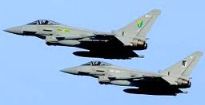No-Fly Zone May Cost U.S. $800M
With U.S. and coalition forces bombarding Libya leader Muammer al-Qaddafi’s forces from the sea and air, the cost for the first day alone of the operation was well over $100 million with the total price tag expected to grow much higher the longer the strikes continue, analysts said.
Operation Odyssey Dawn appears to be focused on creating a limited no-fly zone mostly targeting Tripoli and other areas along the coast, which will require a wide range of military assets.
With allies expected to shoulder some of the bill, the initial stages of taking out Libya’s air defenses could ultimately cost U.S.-led coalition forces between $400 million and $800 million, according to a report released by the Center for Strategic and Budgetary Assessments earlier this month.
Maintaining a coastal no-fly-zone after those first strikes would cost in the range of $30 million to $100 million per week – not pocket change by any means, but far less than the $100 million to $300 million estimated weekly cost for patrolling the skies above the entire 680,000-square-mile country.
These unanticipated costs come at a time when the Pentagon is putting pressure on Capitol Hill to pass a fiscal 2011 defense budget. Continuing to operate under a stopgap continuing resolution through September, senior defense officials argue, would amount to a $23 billion cut to the military’s request for the current fiscal year, which began Oct. 1. The Pentagon wants $708.3 billion for this year, including $159.3 billion for the wars in Iraq and Afghanistan.
Still, the Pentagon has the money in its budget to cover unexpected contingencies and can also use fourth-quarter dollars to cover the costs of operations now. “They’re very used to doing this operation where they borrow from Peter to pay Paul,” said Gordon Adams, the White House Office of Management and Budget’s associate director for national security during the Clinton administration.
Indeed, former Pentagon comptroller Dov Zakheim estimated that the Defense Department would only need to send a request for supplemental funding to Capitol Hill if the U.S. military’s share of operations expenses for Libya topped $1 billion. Such a request would likely be met with mixed reactions in a Congress focused on deficit reduction. And, while many key lawmakers have been agitating for action in Libya, others have been more reluctant and have urged the Obama administration send them a declaration of war.
Senate Foreign Relations ranking member Richard Lugar, R-Ind., says Congress should have had the opportunity to weigh in on what he said will be “a very expensive operation, even in a limited way.”
Click here to read more.


